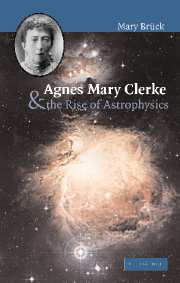Book contents
- Frontmatter
- Contents
- Acknowledgements
- Introduction
- 1 Family background in County Cork
- 2 Ireland and Italy
- 3 London, the literary scene
- 4 The History of Astronomy
- 5 A circle of astronomers
- 6 A visit to South Africa
- 7 The System of the Stars
- 8 Social life in scientific circles
- 9 Homer, the Herschels and a revised History
- 10 The opinion moulder
- 11 Popularisation, cryogenics and evolution
- 12 Problems in Astrophysics
- 13 Women in astronomy in Britain in Agnes Clerke's time
- 14 Revised System of the Stars
- 15 Cosmogonies, cosmology and Nature's spiritual clues
- 16 Last days and retrospect
- 17 Epilogue
- Notes
- Appendix
- Bibliography
- Index
- Frontmatter
- Contents
- Acknowledgements
- Introduction
- 1 Family background in County Cork
- 2 Ireland and Italy
- 3 London, the literary scene
- 4 The History of Astronomy
- 5 A circle of astronomers
- 6 A visit to South Africa
- 7 The System of the Stars
- 8 Social life in scientific circles
- 9 Homer, the Herschels and a revised History
- 10 The opinion moulder
- 11 Popularisation, cryogenics and evolution
- 12 Problems in Astrophysics
- 13 Women in astronomy in Britain in Agnes Clerke's time
- 14 Revised System of the Stars
- 15 Cosmogonies, cosmology and Nature's spiritual clues
- 16 Last days and retrospect
- 17 Epilogue
- Notes
- Appendix
- Bibliography
- Index
Summary
Some short passages from Agnes Clerke's writings are given which give an idea of her style of writing as well as of her versatility.
Precursors of Newton
(from Edinburgh Review, 1879)
The problem of gravity was the supreme question of that time. It stood first among the orders of the day of the scientific council. It was instinctively felt that until it should be disposed of, no real progress could be made in physical knowledge and, slowly, but surely, the way was being prepared for a great discovery. Galileo had made Newton possible. Men's ideas were gradually clarifying; the great cosmical analogies, now so familiar, were, step by step emerging out of the dusk of ignorance; antiquated prepossessions were sinking in a sediment of cloudy cavil, out of sight. Heaven was assimilated to earth, and earth to heaven; the old gratuitous separation between the starry firmament over our heads and the solid globe under our feet was abolished by acclamation; and it was felt that the coming law, to be valid, must embrace in its operation the whole of the visible universe. Towards this consummation Gilbert contributed something by his theory of universal magnetism; and Galileo, as well as Bacon and Horrocks foresaw that in this direction lay the coveted secret.
- Type
- Chapter
- Information
- Agnes Mary Clerke and the Rise of Astrophysics , pp. 261 - 268Publisher: Cambridge University PressPrint publication year: 2002



